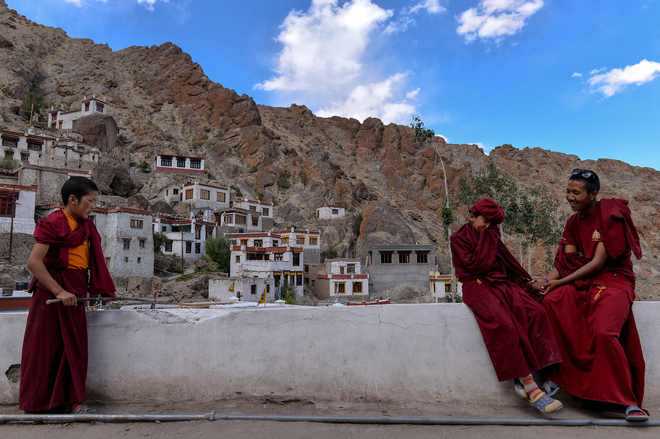Ladakh residents want their identity to be safeguarded
Sumit Hakhoo
Tribune News Service
Jammu, September 3
The decision of the Central government to convert Ladakh into a Union Territory (UT) will complete one month on September 5 and regions’ two districts — Leh and Kargil- are keenly following developments as UT is slowly taking its shape.
From October 31, the Union Territory, often referred as ‘cold desert’, having Shia Muslims majority in Kargil and Buddhists in Leh, will be directly ruled by New Delhi via Union Home Ministry but apprehensions remain among people. Without a legislature, a Lieutenant Governor (LG) will govern the vast region functioning as the Chief Minister.
The entire government will directly decide the allocation of funds, development projects and policing in the strategic region sharing volatile Line of Control (LoC) with Pakistan-occupied Kashmir (PoK) and Line of Actual Control (LAC) with China.
“It’s a dream come true as after decades Leh will get the UT status. We are looking forward to a developed and economically empowered region, but our unique identity should be safeguarded. There is still confusion among people,” said Rigzin Namgyal, a social activist who works in the hospitality sector in Leh.
According to official sources, the Central government, keeping in view the sensitivities, Ladakh Hill Development Council (LAHDC) Act amended in 2018 during the Governor’s rule, would continue to govern administrative aspects of the Union Territory. But people are debating how direct the Central rule will impact their region economically and socially, especially usage of land.
Under the united Jammu & Kashmir state, Ladakh was governed by the Autonomous Hill Development Councils (Kargil and Leh) having various administrative powers and there is still no clarity what will be the fate of these bodies.
There is also anxiety among the vast majority of Muslims who inhabit Kargil district about economic and social impact if outsiders flood the area. The religious and social groups have decided to adopt wait-and-watch policy.
“Unless our religious rights are protected we will continue to oppose the UT status. It has been conveyed to the Governor Administration”, said Sheikh Mohammad Lutfi, a senior member of the IKMT, a powerful religious body.









